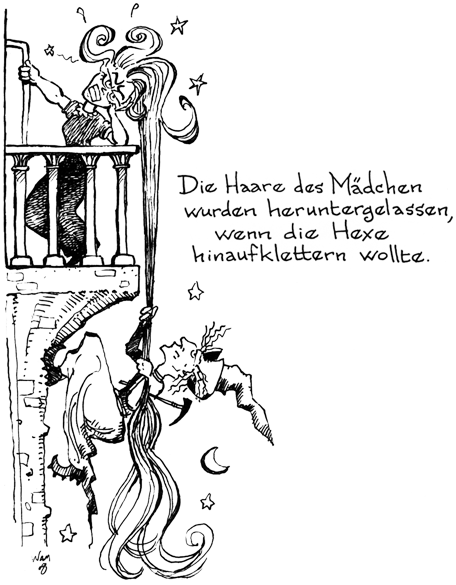![]() Verbs:Das Passiv in der Vergangenheit
Verbs:Das Passiv in der Vergangenheit
Voice is a grammatical category that describes the relationship between a verb and its subject. As outlined in Passiv im Präsens, if the subject is acting, the voice is active, but if the subject is being acted upon, the voice is passive. The passive voice is used when there is a general subject (e.g., people, one) or when the agent of the action is not known or not important.
Passive voice is used mostly in journalistic or scientific writing, and is a rather formal stylistic element.
| Active voice | Der Mann hat einige Rapunzeln aus dem Garten gestohlen. | The man stole a few lamb's lettuce from the garden. |
| Passive voice | Einige Rapunzeln sind aus dem Garten der alten Hexe gestohlen worden. | A few lamb's lettuce were stolen from the old witch's garden. |
In the first example above, the man (i.e., the agent) steals the lamb's lettuce (i.e., acts upon the direct object). In the second example, the agent is not named (if you were the man, would you want anybody to know what you did??); the new subject is the lamb's lettuce: we know that it was stolen. The emphasis is what was stolen, and what happened rather than who did the stealing. That comes later, when the man has his comeuppance ...
![]() Stating agency
Stating agency
Stating the agent in a passive construction - with the use of the dative preposition von (by) or the accusative preposition durch - is the same in the past tense as in the present tense.
The agent is a person or persons:
| Passive voice + agent | Leider wurde der Mann von der alten Hexe erwischt. | Unfortunately, the man was caught by the old witch. |
The agent is an inanimate force (i.e., the weather):
| Passive voice + inanimate agent |
Das Abendessen wurde durch die Unbeholfenheit des Mannes in Gefahr gebracht. Wer solch eine habgierige Frau hat, sollte ein erfolgreicher Dieb sein! | The dinner was jeopardized by the man's clumsiness. He who has such a greedy wife should be a more successful thief! |
![]() Das Imperfekt
Das Imperfekt
In the simple past tense, the auxiliary verb werden is conjugated in the simple past (i.e., wurde, wurden, etc.). You may remember that the simple past - das Imperfekt - is used mostly in written or formal narratives. In spoken language people typically avoid the passive, or if they use it in the past tense, they use the present perfect form (see below).
| Sofort nach ihrer Geburt wurde Rapunzel von der Hexe 'adoptiert'. | Immediately after her birth, Rapunzel was 'adopted' by the witch. |
| Als das kleine Mädchen 12 Jahre alt wurde, wurde es in den Turm geschlossen. | When the little girl turned 12 years old, she was locked in the tower. |
| Die Haare des Mädchens wurden heruntergelassen, wenn die Hexe hinaufklettern wollte. | The girl's hair was let down whenever the witch wanted to climb up. |
| werden • to become | |
| ich wurde | wir wurden |
| du wurdest | ihr wurdet |
| er/sie/es wurde | sie wurden |
![]() Das Perfekt
Das Perfekt
In the present perfect tense, the auxiliary verb werden is conjugated in the present perfect (i.e., ist geworden, sind geworden, etc.). However, the past participle geworden is always abbreviated as worden in the passive voice.
If a speaker cannot avoid the passive voice in spoken language, this conversational past form - das Perfekt - is used instead of the Imperfekt form, which is the more formal of the two (see above).
| Eines Tages ist Rapunzel von einem Königssohn gesehen worden; sie verliebten sich natürlich ineinander. | One day, the beautiful girl was seen by a young king; they fell in love with each other, of course. |
| Aber dann sind Rapunzels Haare geschnitten worden, damit der Königssohn nicht mehr hinaufklettern konnte. | But then Rapunzel's hair was cut so that the young king could not climb up anymore. |
| werden • to become | |
| ich bin geworden | wir sind geworden |
| du bist geworden | ihr seid geworden |
| er/sie/es ist geworden | sie sind geworden |


